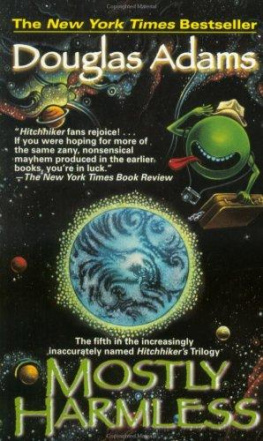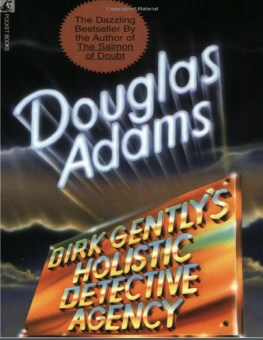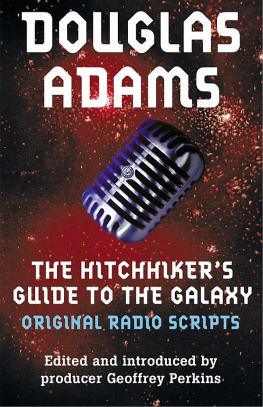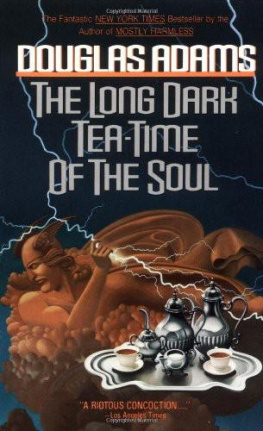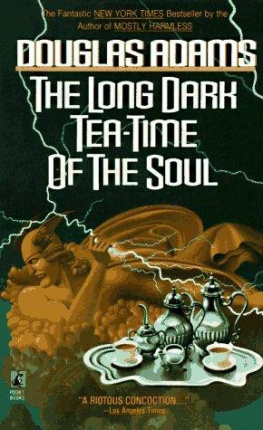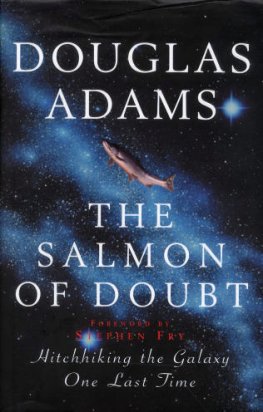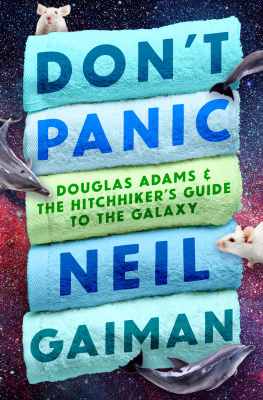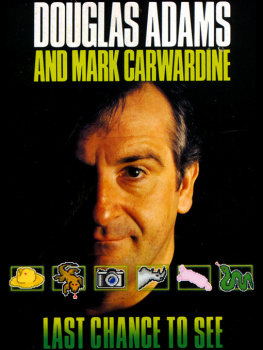Douglas Adams - Mostly Harmless
Here you can read online Douglas Adams - Mostly Harmless full text of the book (entire story) in english for free. Download pdf and epub, get meaning, cover and reviews about this ebook. year: 2000, publisher: Del Rey, genre: Art. Description of the work, (preface) as well as reviews are available. Best literature library LitArk.com created for fans of good reading and offers a wide selection of genres:
Romance novel
Science fiction
Adventure
Detective
Science
History
Home and family
Prose
Art
Politics
Computer
Non-fiction
Religion
Business
Children
Humor
Choose a favorite category and find really read worthwhile books. Enjoy immersion in the world of imagination, feel the emotions of the characters or learn something new for yourself, make an fascinating discovery.
- Book:Mostly Harmless
- Author:
- Publisher:Del Rey
- Genre:
- Year:2000
- Rating:5 / 5
- Favourites:Add to favourites
- Your mark:
- 100
- 1
- 2
- 3
- 4
- 5
Mostly Harmless: summary, description and annotation
We offer to read an annotation, description, summary or preface (depends on what the author of the book "Mostly Harmless" wrote himself). If you haven't found the necessary information about the book — write in the comments, we will try to find it.
Mostly Harmless — read online for free the complete book (whole text) full work
Below is the text of the book, divided by pages. System saving the place of the last page read, allows you to conveniently read the book "Mostly Harmless" online for free, without having to search again every time where you left off. Put a bookmark, and you can go to the page where you finished reading at any time.
Font size:
Interval:
Bookmark:

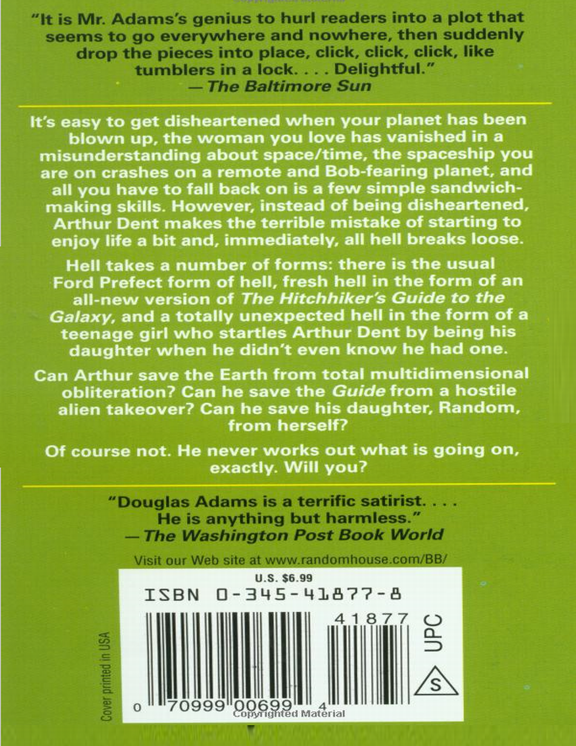
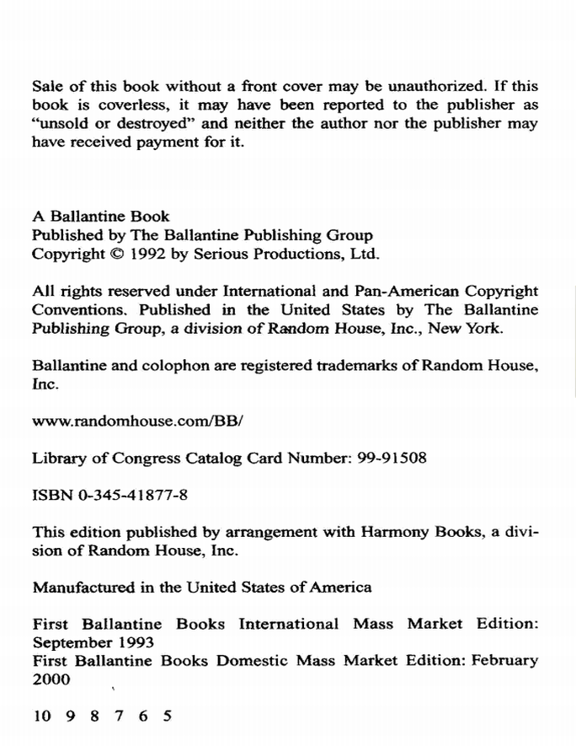

For Ron
With grateful thanks to Sue Freestone and Michael
Bywater for their support, help and constructive abuse.
Anything that happens, happens.
Anything that, in happening, causes something else to
happen, causes something else to happen.
Anything that, in happening, causes itself to happen again, happens again.
It doesnt do it in chronological order, though.
The history of the Galaxy has got a little muddled, for a number of reasons: partly because those who are trying to keep track of it have got a little muddled, but also because some very muddling things have been happening anyway.
One of the problems has to do with the speed of light and the difficulties involved in trying to exceed it. You cant. Nothing travels faster than the speed of light with the possible exception of bad news, which obeys its own special laws. The Hingefreel people of Arkintoofle Minor did try to build spaceships that were powered by bad news but they didnt work particularly well and were so extremely unwelcome whenever they arrived anywhere that there wasnt really any point in being there.
So, by and large, the peoples of the Galaxy tended to languish in their own local muddles and the history of the Galaxy itself was, for a long time, largely cosmological.
Which is not to say that people werent trying. They tried sending off fleets of spaceships to do battle or business in distant parts, but these usually took thousands of years to get anywhere. By the time they eventually arrived, other forms of travel had been discovered which made use of hyperspace to circumvent the speed of light, so that whatever battles it was that the slower-than-light fleets had been sent to fight had already been taken care of centuries earlier by the time they actually got there.
This didnt, of course, deter their crews from wanting to fight the battles anyway. They were trained, they were ready, theyd had a couple of thousand years sleep, theyd come a long way to do a tough job and by Zarquon they were going to do it.
This was when the first major muddles of Galactic history set in, with battles continually re-erupting centuries after the issues they had been fought over had supposedly been settled. However, these muddles were as nothing to the ones which historians had to try and unravel once time-travel was discovered and battles started pre-erupting hundreds of years before the issues even arose. When the Infinite Improbability Drive arrived and whole planets started turning unexpectedly into banana fruitcake, the great history faculty of the University of MaxiMegalon finally gave up, closed itself down and surrendered its buildings to the rapidly growing joint faculty of Divinity and Water Polo, which had been after them for years.
Which is all very well, of course, but it almost certainly means that no one will ever know for sure where, for instance, the Grebulons came from, or exactly what it was they wanted. And this is a pity, because if anybody had known anything about them, it is just possible that a most terrible catastrophe would have been averted or at least would have had to find a different way to happen.
Click, hum.
The huge grey Grebulon reconnaissance ship moved silently through the black void. It was travelling at fabulous, breath-taking speed, yet appeared, against the glimmering background of a billion distant stars to be moving not at all. It was just one dark speck frozen against an infinite granularity of brilliant night. On board the ship, everything was as it had been for millennia, deeply dark and silent.
Click, hum.
At least, almost everything.
Click, click, hum.
Click, hum, click, hum, click, hum.
Click, click, click, click, click, hum.
Hmmm.
A low level supervising program woke up a slightly higher level supervising program deep in the ships semi-somnolent cyberbrain and reported to it that whenever it went click all it got was a hum.
The higher level supervising program asked it what it was supposed to get, and the low level supervising program said that it couldnt remember exactly, but thought it was probably more of a sort of distant satisfied sigh, wasnt it? It didnt know what this hum was. Click, hum, click, hum. That was all it was getting.
The higher level supervising program considered this and didnt like it. It asked the low level supervising program what exactly it was supervising and the low level supervising program said it couldnt remember that either, just that it was something that was meant to go click, sigh every ten years or so, which usually happened without fail. It had tried to consult its error look-up table but couldnt find it, which was why it had alerted the higher level supervising program to the problem.
The higher level supervising program went to consult one of its own look-up tables to find out what the low level supervising program was meant to be supervising.
It couldnt find the look-up table.
Odd.
It looked again. All It got was an error message. It tried to look up the error message in its error message look-up table and couldnt find that either. It allowed a couple of nanoseconds to go by while it went through all this again. Then it woke up its sector function supervisor.
The sector function supervisor hit immediate problems. It called its supervising agent which hit problems too. Within a few millionths of a second virtual circuits that had lain dormant, some for years, some for centuries, were flaring into life throughout the ship. Something, somewhere, had gone terribly wrong, but none of the supervising programs could tell what it was. At every level, vital instructions were missing, and the instructions about what to do in the event of discovering that vital instructions were missing, were also missing.
Small modules of software agents surged through the logical pathways, grouping, consulting, re-grouping. They quickly established that the ships memory, all the way back to its central mission module, was in tatters. No amount of interrogation could determine what it was that had happened.
Even the central mission module itself seemed to be damaged.
This made the whole problem very simple to deal with. Replace the central mission module. There was another one, a backup, an exact duplicate of the original. It had to be physically replaced because, for safety reasons, there was no link whatsoever between the original and its backup. Once the central mission module was replaced it could itself supervise the reconstruction of the rest of the system in every detail, and all would be well.
Robots were instructed to bring the backup central mission module from the shielded strong room, where they guarded it, to the ships logic chamber for installation.
This involved the lengthy exchange of emergency codes and protocols as the robots interrogated the agents as to the authenticity of the instructions. At last the robots were satisfied that all procedures were correct. They unpacked the backup central mission module from its storage housing, carried it out of the storage chamber, fell out of the ship and went spinning off into the void.
This provided the first major clue as to what it was that was wrong.
Next pageFont size:
Interval:
Bookmark:
Similar books «Mostly Harmless»
Look at similar books to Mostly Harmless. We have selected literature similar in name and meaning in the hope of providing readers with more options to find new, interesting, not yet read works.
Discussion, reviews of the book Mostly Harmless and just readers' own opinions. Leave your comments, write what you think about the work, its meaning or the main characters. Specify what exactly you liked and what you didn't like, and why you think so.

